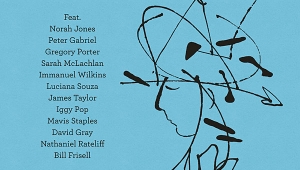| Columns Retired Columns & Blogs |
Recording of June 1996: New Moon Daughter
CASSANDRA WILSON: New Moon Daughter
Cassandra Wilson, vocals; Brandon Ross, guitars; Kevin Breit, guitars, banjo, Irish bazouki; Charlie Burnham, violin; Lonnie Plaxico, bass; Dougie Bowne, drums; others.
Blue Note CDP 8 32861 2 (CD only). Craig Street, prod.; Danny Kopelson, eng. TT: 61:59
Cassandra Wilson, vocals; Brandon Ross, guitars; Kevin Breit, guitars, banjo, Irish bazouki; Charlie Burnham, violin; Lonnie Plaxico, bass; Dougie Bowne, drums; others.
Blue Note CDP 8 32861 2 (CD only). Craig Street, prod.; Danny Kopelson, eng. TT: 61:59
Even before her first Blue Note disc, 1993's groundbreaking Blue Light 'Til Dawn, Cassandra Wilson was on her way toward revolutionizing the art of jazz singing. Her work with the M-base crew (Steve Coleman, Lonnie Plaxico, etc.) on Verve's JMT label combined funk, hip-hop, rock, and jazz into a welcome change from the reworked standards of her predecessors.
 Blue Light 'Til Dawn exposed her to a wider audience, one that included pop fans as well as jazzers. The covers of songs by Robert Johnson, Joni Mitchell, and Van Morrison helped, but it was producer Craig Street's stripping away of all but the bare minimum of accompaniment from her honeyed voice that exposed that fabulous instrument to the light it deserves.
Blue Light 'Til Dawn exposed her to a wider audience, one that included pop fans as well as jazzers. The covers of songs by Robert Johnson, Joni Mitchell, and Van Morrison helped, but it was producer Craig Street's stripping away of all but the bare minimum of accompaniment from her honeyed voice that exposed that fabulous instrument to the light it deserves.
With New Moon Daughter, evidently Wilson and Street figured, if it ain't broke, don't fix it. Here are more pop covers: U-2's "Love is Blindness," Neil Young's "Harvest Moon," and, yes, "Last Train to Clarksville" (that's the Monkees, if you're over 60 or live in a cave). Once more, Street surrounds that voice with instruments that offer little competition for sonic space, and then as few as possible. Billie Holiday's meditation on lynchings, "Strange Fruit," uses only Chris Whitley's dissonant dobro, Graham Haynes's cornet, and Plaxico's upright in an arrangement as haunting as its subject matter.
This approach works so well because Wilson's voice is as thick and smooth as caramel, deep and wide as the Mississippi. Her Southern roots turn each tune into a blues and make "Death Letter Blues" as good as blues gets. More important, her intelligence and artistry turn each tune into Cassandra Wilson music.
Street's minimalist, hyper-real recording gets the most out of all the instruments, not just the voice. The sound is intimate and warm in a way that makes the daring of the music go down easily without compromising it. But Street supplies the setting, Wilson supplies the jewel. There are plenty of examples of empty exercises in production out there. Wilson and Street have found an excellent marriage of form and content, and we, as much as they, are the winners.—Michael Ross
Wes Phillips on the sound
Cassandra Wilson, who arranged most of the material, and Brandon Ross, who arranged three songs and co-arranged another two, aren't afraid of the bold sonic stroke—and perhaps their boldest is the extent to which they let the songs themselves dominate our attention. Ms. Wilson is a most intelligent singer, and her respect for the lyrics is manifest, but she's also a mistress of tonal color. Her voice, as MR suggests, is thick and sweet, but I find it stronger and darker than caramel—molasses, perhaps.
Within the worlds of the songs, the instruments are rendered with wonderful palpability. Plaxico's bass serves as the disc's heartbeat, his powerful presence freeing Wilson to insinuate her instrument before, after, and throughout the beat and the proper pitch. Special mention must also be given to Ross's guitars, which add brilliant yet widely varied colors to the mix.
Relaxed and natural, New Moon Daughter's spare textures leave a lot of room for magic to develop—as does the relaxed, very natural ambience of the recording itself. MR singles out the haunting minimalism of Lewis Allen's "Strange Fruit"; it is brilliantly realized, but I've never heard a version of that song that didn't linger in the memory. Most revelatory for me was Hank Williams's "I'm So Lonesome I Could Cry": Wilson's plaintive voice and the wide-open, almost windswept spaces of the arrangement transcend the work's country origins without ever actually abandoning them.
A lovely disc, and a great harbinger of things to come.—Wes Phillips
- Log in or register to post comments




































